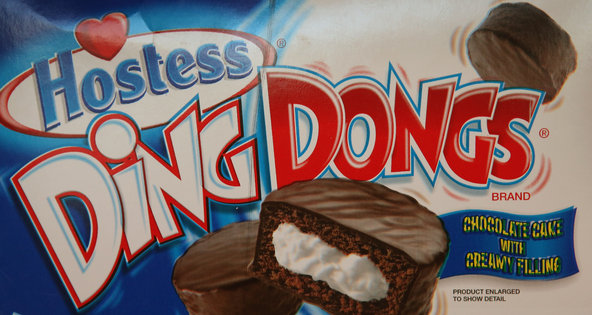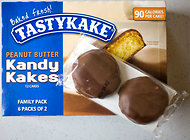 Scott Olson/Getty Images
Scott Olson/Getty Images
Few would consider Twinkies fine dining. But the threat of their demise is evoking nostalgia, even from foodies who hadn’t deigned to eat them in years.
As Hostess Brands shut down production on Friday, customers scoured stores to buy a few. By the evening, more than 24,000 people had signed an online petition calling for the White House to “nationalize the Twinkie industry.”
Now, the value of that brand power is about to be tested.
While Hostess Brands, the bankrupt maker of Twinkies, Ho Hos and Funny Bones, is planning to close up shop, the confections could find a second home. As part of its liquidation process, the company will most likely sell off its assets, including its portfolio of junk food.
One company’s castoffs can be another company’s golden goose — or in this case, cream-filled confection. It is a common trade in bankruptcy court. Sellers are hoping to drum up cash for their creditors, and buyers are betting they can revive the brands.
 Jessica Kourkounis for The New York TimesTasty Baking, the maker of Tastykakes, was bought by Flower Foods last year.
Jessica Kourkounis for The New York TimesTasty Baking, the maker of Tastykakes, was bought by Flower Foods last year.
In 2009, the Gordon Brothers Group and Hilco Consumer Capital bought the assets of Polaroid, which pioneered instant photography. Last year, Polaroid struck a partnership with Lady Gaga. Hilco also owns Linens ’N’ Things, the home goods retailer that has been reinvented online.
“It’s sometimes easier just to take an old brand that exists because it’s easier than creating a new brand,” said Robert Passikoff, the president of Brand Keys, a consulting firm.
It could be hard to attract a suitor willing to consume the entire operations of Hostess. The company had tried unsuccessfully to sell itself for years, finding no takers for its 33 bakeries or hundreds of distribution centers. Gregory Rayburn, the chief executive of Hostess, said in an interview that the baking industry was already brimming with capacity, which might prompt buyers to focus on the products alone.
The Hostess brands could look especially appealing, without the baggage of the company’s debt and labor costs. Even though consumers are increasingly crunching on kale, Twinkies and other sugary snacks still make loads of money. Hostess makes billions of dollars of sales each year.
Such orphan brands could attract an array of interest from Wall Street types like the Gordon Brothers and Hilco with a knack for breathing new life into tired brands. Food companies have also proved eager to snap up discarded labels.
Flowers Foods, a baking goods company based in Thomasville, Ga., has struck 18 deals since 1999. Last year, it bought Tasty Baking, the maker of Philadelphia’s beloved Tastykakes, after the company nearly collapsed.
Analysts said that Flowers would make a natural buyer for some of Hostess’s snack brands. So too could Grupo Bimbo, the Mexican baking giant that has bought Arnold bread, Entenmann’s pastries and a host of regional brands like Heiner’s and Rainbo. The Pinnacle Foods Group, a packaged foods company with a history of buying orphan food brands like Swanson frozen dinners and Duncan Hines baking mixes, may also be interested.
Representatives of Flowers, Bimbo, Gordon Brothers and Hilco declined to comment or were not available for comment.
Well-known brands cannot always be resurrected with new management. The Borders Group struck a deal to sell itself to the Najafi Companies, a private equity firm, last year. But the sale was rejected by the bookseller’s creditors, and Borders was eventually sold for parts.
With food companies, brand matters. Profit margins are slim and stores are stocking their shelves with only the top sellers. America’s tastes, too, are evolving, and consumers are losing their preference for junky, processed foods — or least limiting their intake.
In the current market, midsize food manufacturers in less popular categories are finding it tough to go it alone. In 2008, Procter Gamble sold its Folgers brand, and this year, it offloaded Pringles, leaving the food business altogether.
Even the major food manufacturers with hundreds of brands are rethinking their lineups and trimming down portfolios. Earlier this year, Kraft Foods cut itself in two, splitting faster-growing snacks like Oreos and Chips Ahoy from staples like its namesake cheese product and Maxwell House coffee.
Hostess may find it easier to sell off individual brands, instead of the entire portfolio. Burt P. Flickinger III, the managing director of the Strategic Source Group, said that Hostess and Twinkies were truly national brands that would be sold quickly. Lesser-known snacks like Ding Dongs were a “jump ball,” Mr. Flickinger said. And the shelf space for Wonder Bread, the spongy, pale white staple of baby boomers’ younger days, has shrunk so much that it may survive only as a fraction of its former self, Mr. Flickinger said.
Such brands lack the sort of emotional attachment that branding experts say keeps people drawn to Twinkies, their status as the butt of innumerable jokes notwithstanding. So popular are the snacks that reporters asked Gov. Chris Christie of New Jersey for his thoughts on the Hostess troubles at an appearance on Friday.
“It’s bad that I even said the word ‘Twinkies’ from behind this microphone,” said the governor, whose girth has been the subject of many conversations.
Until the fate of the Hostess brands is decided, some customers stocked up on their favorites snacks. “I mean, I love Twinkies,” said Joe Yi, a 24-year-old postbaccalaureate student at Columbia University. “I’m planning to buy a few.” Mr. Yi, who grew up in Queens, remembered buying packages of Twinkies some days after elementary school.
Some consumers saw an opportunity for profit. On eBay, boxes of Twinkies, listed for several thousand dollars, were selling modestly online for more than $10. But at a C-Town supermarket in Manhattan, a box of 10 Twinkies sells for $2.79.
William Alden contributed reporting.
Article source: http://dealbook.nytimes.com/2012/11/16/a-push-to-save-the-twinkies/?partner=rss&emc=rss